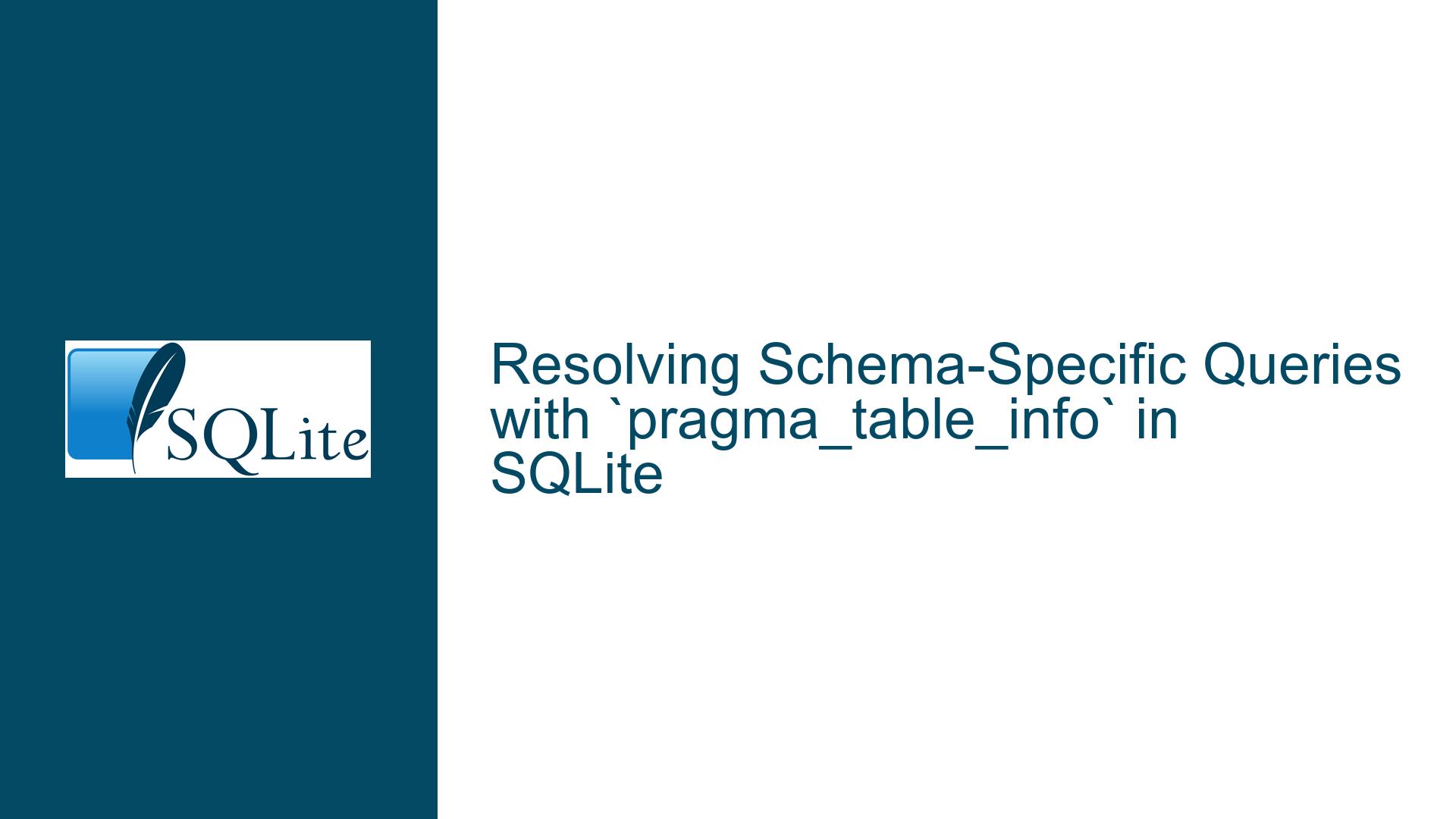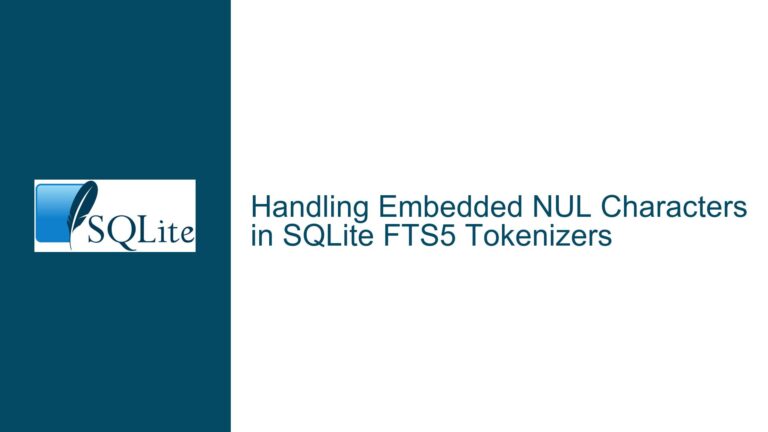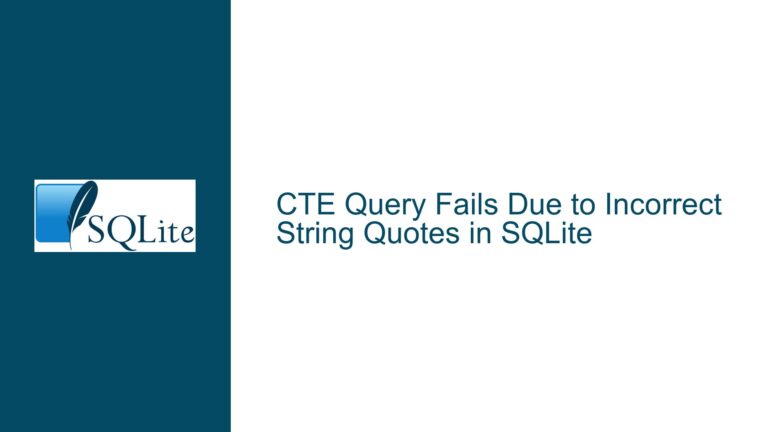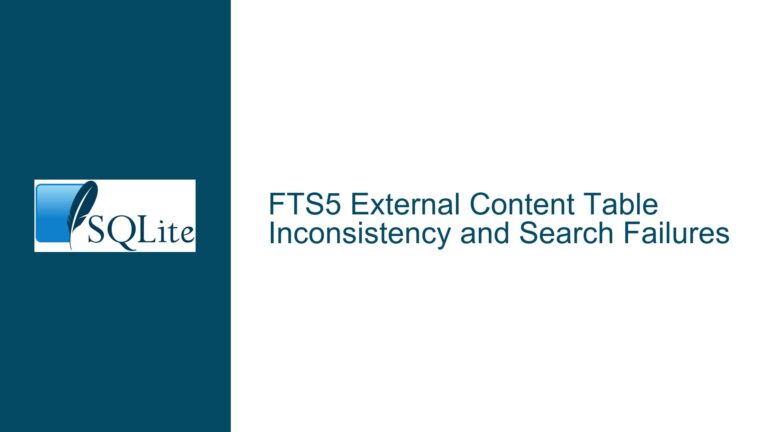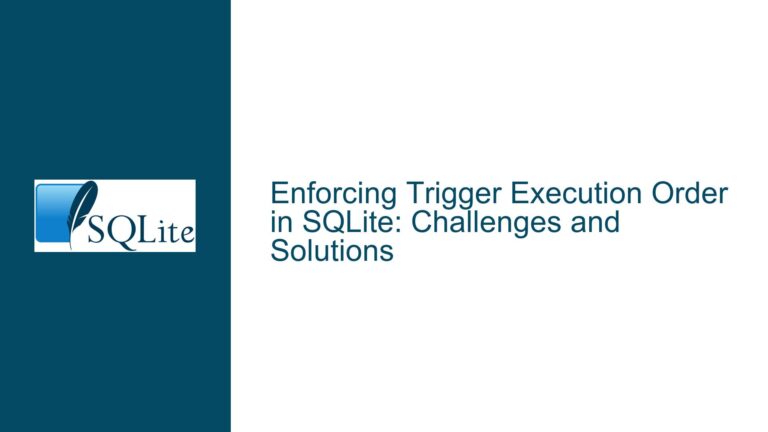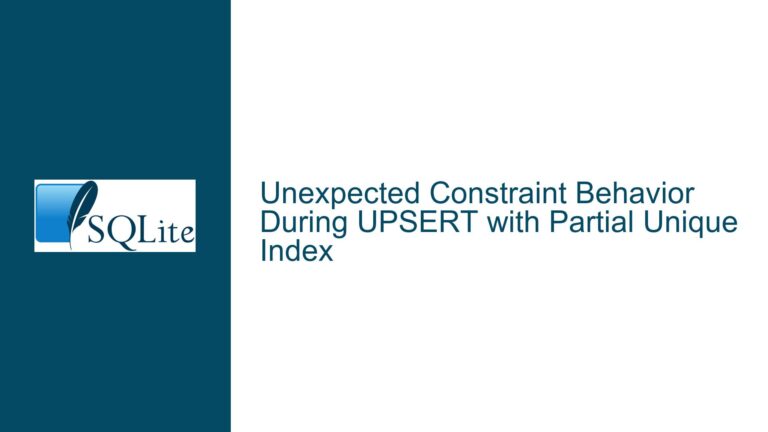Resolving Schema-Specific Queries with `pragma_table_info` in SQLite
Understanding the Challenge of Schema-Specific pragma_table_info Queries
When working with SQLite, one of the most common tasks is retrieving metadata about a table’s structure, such as column names and data types. The pragma_table_info function is a powerful tool for this purpose, as it returns detailed information about the columns of a specified table. However, complications arise when dealing with attached databases or multiple schemas, as SQLite’s default behavior does not always make it straightforward to specify a schema when using pragma_table_info.
The core issue revolves around the inability to directly specify a schema in the pragma_table_info function using the conventional SELECT syntax. For example, if you have two tables named tbl—one in the main database and another in an attached database (a.tbl)—you might expect to query their metadata using pragma_table_info('a.tbl'). However, this approach does not work as intended, leading to confusion and the need for workarounds.
This problem is particularly relevant in scenarios where databases are modular or distributed across multiple files, such as in multi-tenant applications or when working with legacy systems. Without a clear way to specify the schema, developers are forced to resort to less efficient methods, such as post-processing the results of PRAGMA table_info or manually filtering results based on the schema.
Exploring the Root Causes of Schema Specification Issues
The inability to directly specify a schema in pragma_table_info queries stems from a combination of SQLite’s design choices and the way pragma functions are implemented. To understand this, it is essential to delve into the mechanics of pragma functions and how they interact with schemas.
1. Pragma Functions and Their Schema Handling
Pragma functions in SQLite are special commands that provide metadata or modify database behavior. Unlike standard SQL functions, pragmas are not always designed to work seamlessly with schemas. The pragma_table_info function, for instance, is implemented as a table-valued function, meaning it returns a set of rows that can be queried like a regular table. However, its schema-handling capabilities are limited by design.
When you attempt to use pragma_table_info('a.tbl'), SQLite interprets 'a.tbl' as a single argument—the table name—rather than parsing it as a schema-qualified table reference. This behavior is consistent with SQLite’s general approach to pragma functions, which do not natively support schema qualification in the same way as standard SQL queries.
2. Hidden Input Parameters in pragma_table_info
A deeper examination of pragma_table_info reveals that it has hidden input parameters, namely arg and schema. These parameters are not visible in the function’s signature but are used internally to process the table name and schema. The arg parameter corresponds to the table name, while the schema parameter specifies the database schema in which to look for the table.
The existence of these hidden parameters explains why the function does not work as expected when schema-qualified table names are provided. Instead of parsing 'a.tbl' into separate schema and table components, SQLite treats it as a single string, leading to incorrect or incomplete results.
3. Documentation Ambiguities and Misinterpretations
Another contributing factor is the ambiguity in SQLite’s documentation regarding pragma functions. While the documentation mentions that schema names can be passed as optional arguments, it does not explicitly state how to do so in the context of pragma_table_info. This lack of clarity often leads developers to assume that schema qualification works the same way as in standard SQL queries, resulting in frustration when their attempts fail.
Step-by-Step Troubleshooting and Solutions for Schema-Specific Queries
Resolving the issue of schema-specific pragma_table_info queries requires a combination of understanding SQLite’s internals, leveraging hidden parameters, and adopting best practices for working with pragma functions. Below, we outline a detailed approach to troubleshooting and fixing this problem.
1. Using the Correct Syntax for Schema Specification
The first step is to ensure that the schema is passed as a separate argument to pragma_table_info. As highlighted in the discussion, the correct syntax involves specifying the table name and schema as distinct arguments. For example:
SELECT * FROM pragma_table_info('tbl', 'a');
This approach explicitly separates the table name ('tbl') from the schema ('a'), allowing SQLite to correctly identify the target table in the specified schema.
2. Exploring Hidden Parameters with pragma_table_xinfo
To gain a deeper understanding of how pragma_table_info works, you can use the pragma_table_xinfo function to inspect its internal structure. Running the following query:
PRAGMA table_xinfo('pragma_table_info');
reveals the hidden columns arg and schema, which are used as input parameters. This insight confirms that pragma_table_info expects the table name and schema to be passed separately, rather than as a single schema-qualified string.
3. Filtering Results Based on Schema
If you need to retrieve metadata for multiple tables across different schemas, you can use a combination of pragma_table_info and filtering to achieve the desired results. For example:
SELECT * FROM pragma_table_info WHERE arg = 'tbl' AND schema = 'a';
This query explicitly filters the results to include only rows where the table name matches 'tbl' and the schema matches 'a'. While this approach requires additional filtering, it provides a reliable way to work with schema-specific metadata.
4. Automating Schema-Specific Queries
For scenarios where schema-specific queries are frequent, consider creating a helper function or script to automate the process. For example, you could define a custom SQL function that takes a schema and table name as inputs and returns the corresponding metadata:
CREATE FUNCTION get_table_info(schema_name TEXT, table_name TEXT)
RETURNS TABLE (name TEXT, type TEXT) AS
$$
SELECT name, type FROM pragma_table_info(table_name, schema_name);
$$ LANGUAGE SQL;
This function simplifies the process of querying schema-specific metadata and can be reused across multiple queries.
5. Best Practices for Working with Attached Databases
When working with attached databases, it is crucial to ensure that schemas are correctly referenced in all queries. Always use the ATTACH DATABASE command to link external databases and verify that the schema names are consistent across your application. For example:
ATTACH DATABASE 'path/to/database.db' AS a;
Once the database is attached, you can use the schema name (a) in your queries to access its tables and metadata.
6. Handling Edge Cases and Errors
In some cases, you may encounter errors or unexpected results when working with schema-specific queries. Common issues include incorrect schema names, missing tables, or permission errors. To troubleshoot these problems:
- Verify that the schema name is correct and matches the name used in the
ATTACH DATABASEcommand. - Ensure that the table exists in the specified schema by querying the
sqlite_mastertable:SELECT * FROM a.sqlite_master WHERE type = 'table' AND name = 'tbl'; - Check for permission issues by ensuring that the database file is accessible and not locked by another process.
7. Alternative Approaches for Metadata Retrieval
If pragma_table_info does not meet your needs, consider using alternative methods to retrieve table metadata. For example, you can query the sqlite_master table directly to obtain information about tables and their columns:
SELECT sql FROM a.sqlite_master WHERE type = 'table' AND name = 'tbl';
This query returns the CREATE TABLE statement for the specified table, which can be parsed to extract column names and data types.
8. Leveraging SQLite’s Ecosystem
Finally, take advantage of SQLite’s extensive ecosystem of tools and extensions to streamline your workflow. For example, the SQLite command-line shell (sqlite3) provides built-in support for pragma functions and can be used to test and debug schema-specific queries. Additionally, third-party libraries and ORMs often include utilities for working with metadata, reducing the need for manual queries.
By following these troubleshooting steps and solutions, you can effectively resolve schema-specific issues with pragma_table_info and ensure that your SQLite queries are both accurate and efficient. Whether you are working with attached databases, multiple schemas, or complex metadata requirements, a thorough understanding of SQLite’s internals and best practices will empower you to tackle any challenge with confidence.
